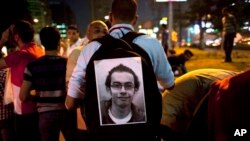CAIRO —
A law drafted by the Egyptian presidency for regulating non-governmental organizations dashes hopes for a free civil society after the 2011 uprising against Hosni Mubarak, Human Rights Watch said on Thursday.
President Mohamed Morsi has said the bill submitted to the Muslim Brotherhood-led parliament on Wednesday would liberate a civil society that was stifled by Mubarak, who was toppled by an uprising ignited by democracy activists.
Human Rights Watch said the new draft was "hostile to the very notion of independent civil society."
"This draft law dashes all hopes that independent groups could operate freely and independently after the revolution," said Sarah Leah Whitson, Middle East and North Africa director at Human Rights Watch.
"Egypt's proposed NGO law would allow the government free rein to cut off funding and halt activities of groups that it finds inconvenient," she added in a statement.
The presidency presented the law this week in an effort to ease concerns about earlier drafts criticized by the United States and the European Union for the restrictions they would have placed on civic activism.
Human Rights Watch identified some improvements in the law, specifically a change that will no longer consider NGO finances as public funds. But the latest draft fell far short of Egypt's international human rights obligations, it said.
It cited flaws including provisions that would allow the government and its security agencies to arbitrarily restrict civil society groups and empower the government to deny access to domestic and international funding.
Since Mubarak was deposed, restrictions on civil society have remained a source of friction with Western states that help to finance non-government organizations working on human rights and economic, social and political development.
Last year, under the temporary rule of the army generals who assumed power from Mubarak, an investigation into the work of international NGOs, some of them U.S.-based, sparked a crisis in ties between the United States and Egypt.
President Mohamed Morsi has said the bill submitted to the Muslim Brotherhood-led parliament on Wednesday would liberate a civil society that was stifled by Mubarak, who was toppled by an uprising ignited by democracy activists.
Human Rights Watch said the new draft was "hostile to the very notion of independent civil society."
"This draft law dashes all hopes that independent groups could operate freely and independently after the revolution," said Sarah Leah Whitson, Middle East and North Africa director at Human Rights Watch.
"Egypt's proposed NGO law would allow the government free rein to cut off funding and halt activities of groups that it finds inconvenient," she added in a statement.
The presidency presented the law this week in an effort to ease concerns about earlier drafts criticized by the United States and the European Union for the restrictions they would have placed on civic activism.
Human Rights Watch identified some improvements in the law, specifically a change that will no longer consider NGO finances as public funds. But the latest draft fell far short of Egypt's international human rights obligations, it said.
It cited flaws including provisions that would allow the government and its security agencies to arbitrarily restrict civil society groups and empower the government to deny access to domestic and international funding.
Since Mubarak was deposed, restrictions on civil society have remained a source of friction with Western states that help to finance non-government organizations working on human rights and economic, social and political development.
Last year, under the temporary rule of the army generals who assumed power from Mubarak, an investigation into the work of international NGOs, some of them U.S.-based, sparked a crisis in ties between the United States and Egypt.





